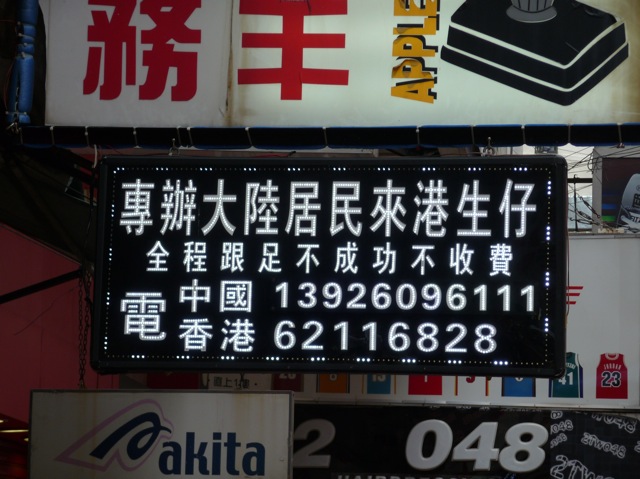Written by Robert Wu for his family and friends
——————————————————————————————-
Hong Kong is a very interesting place. There are over 7 million people living in a small area, and everyone is a character. The following are some of the interesting observations I made in the last 20 years.
Fung Shui is a big thing in HK. To take advantage of this passion, fortune tellers and “fung shui masters” proliferate. As a few successful ones would advertise in subway trains at great expense, it must be a very lucrative business. One wonders how anybody can trust this sleazy-lookiing man?
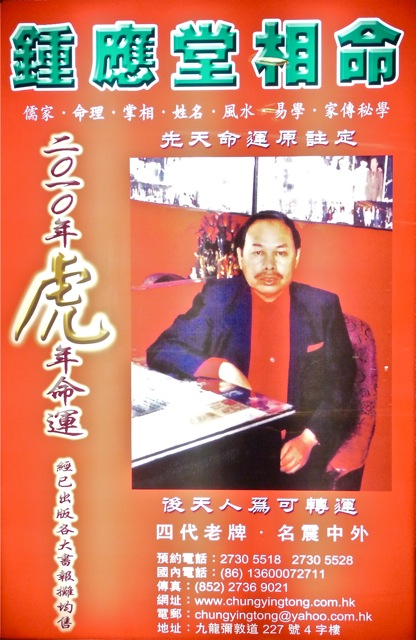
One fortune teller shop in Wan Chai believed in quantity regardless of quality. He plastered thirty (yes, 30) advertising signs around his low ceilinged mezzanine shop and hoped to attract confused people with the many yellow signs.
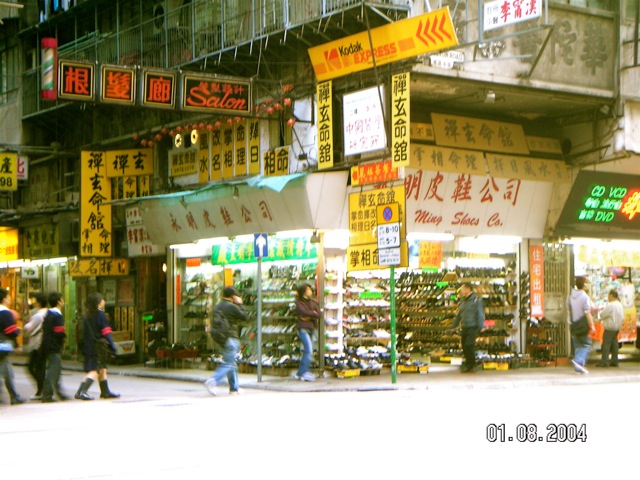
One year later, He reduced the signs to only eight (8). Looks like his flood of signs did not attract enough customers and he lost some self-confidence and became less flamboyant.
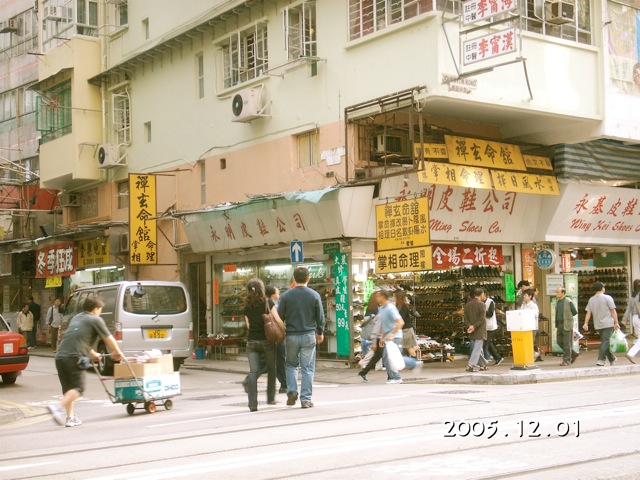
Still another year later, the fortune teller went out of business. If he were good, he might have predicted his own demise and salted away some money for the lean times ahead of him.
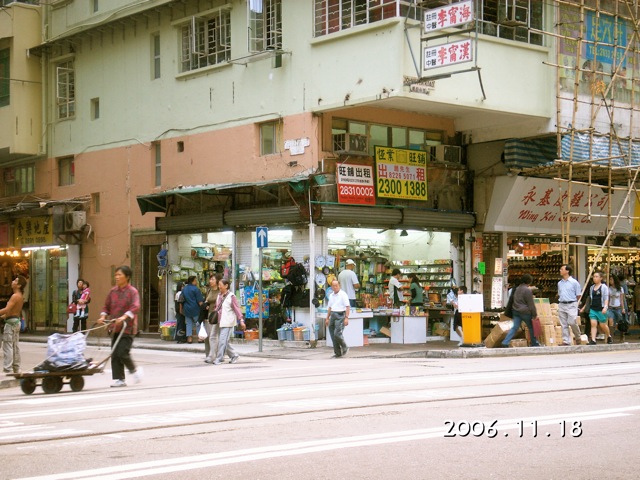
But it’s hard to keep a persistent fortune teller down. Recently, he resurfaced in another low ceilinged mezzanine in Mongkok with only 8 signs. But he takes a great risk in promising to refund his fees if his predictions do not come true. He is really getting desperate for business or he found new confidence in his flowery tongue.
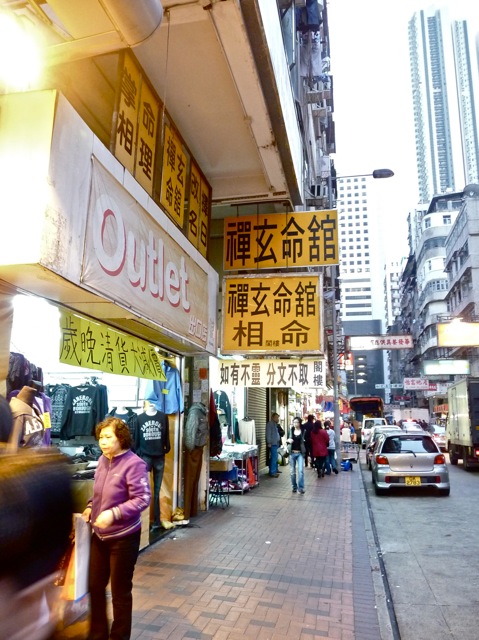
The idol of all fungshui masters is undoubtedly Tony Chan (陳振聰, nicknamed Buckteeth Tone). He helped the richest woman tycoon in Asia Nina Wang with fungshui, then served her in bed. For his services, she gave him US$40 million in cash. After Nina’s death, Buckteeth Tone produced a will and claimed her inheritance of US$3 billion. After a long and scandalous court fight, the judge ruled the Chan will to be forged and granted the estate to Nina’s charitable foundation. One day after the ruling, the police arrested Buckteeth Tone on forgery charges.
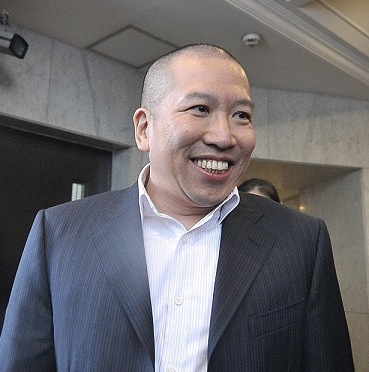
Chinese are inherently superstitious. If they don’t fall prey to fortune tellers, they pray to anything plausible. At the entrance to one restaurant in China, the owner put up an altar and burned incense to Mao. This would cause Mao to turn in his glass mausoleum since Mao was an atheist Communist.
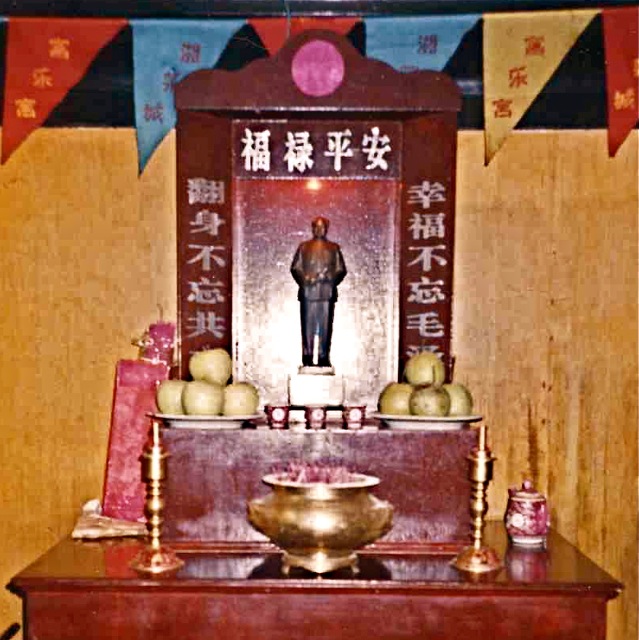
150 years ago, Hong Kong was a nest of Chinese pirates. It took the British Navy years of fighting to subdue those pirates. In one seaside village in 1994, I was surprised to read this urgent warning to residents to beware of pirates. I surmised they were not reincarnation of junk-sailing, pillaging pirates, but common thieves who would come ashore from boats to burglarize.
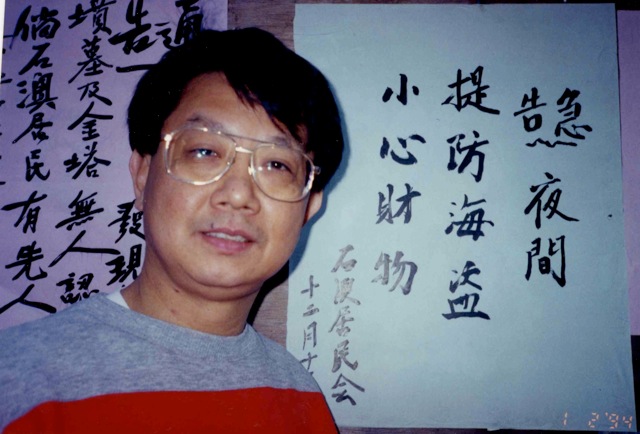
In Macau, an alley is named “Petty Thieves Alley”. The history of this area must be pretty colorful.
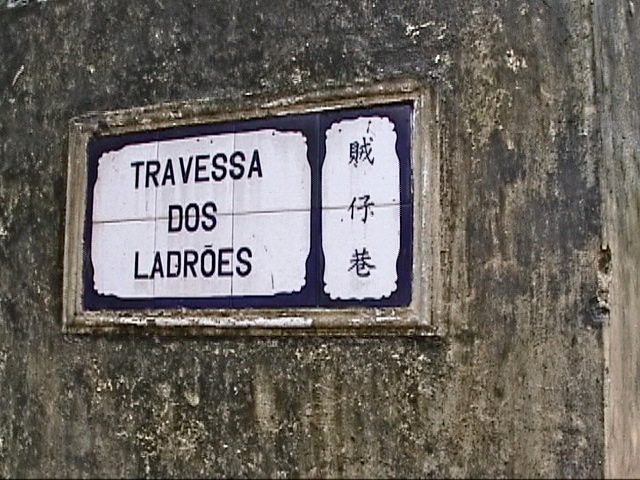
Hong Kong is relatively clean and orderly. One reason may be the all encompassing government restrictions on anything resembling fun.
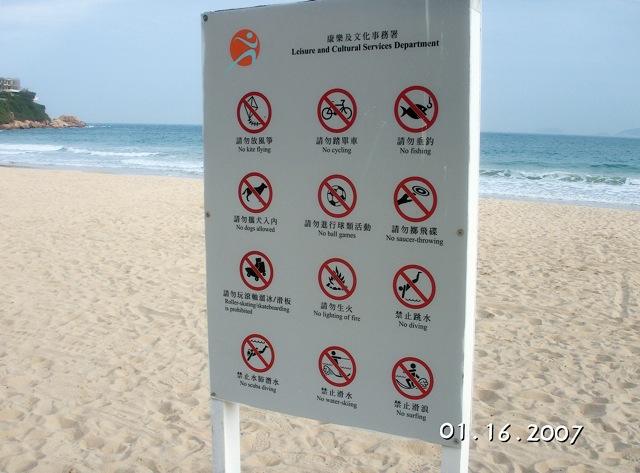
Another may be the ubiquitous barriers and fences surrounding sidewalks and roads. Pedestrians have no option but be herded like cattle through mazes.
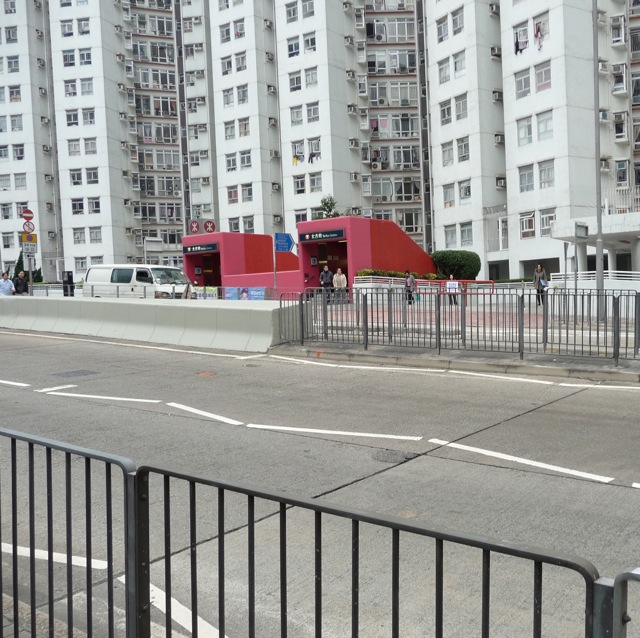
Even Koi gold fish acquired the Hong Kong habit of queueing. When an attendant started to feed the fish, they got in line and headed straight for her.
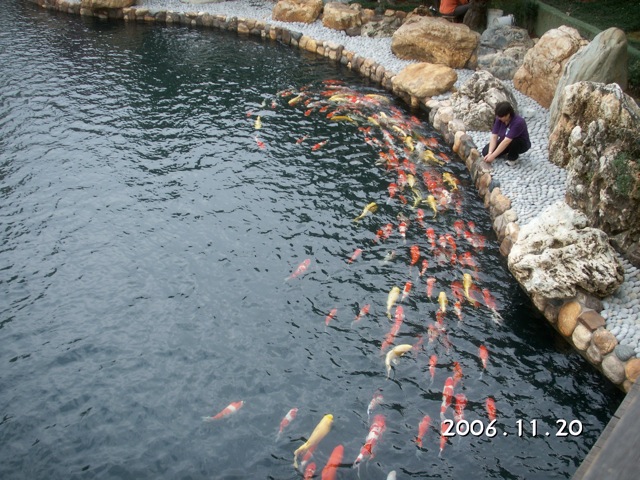
Hong Kong government is starting to crack down on smoking. Cigarette and cigar packages carry large scary pictures and messages that leave nothing to the imagination. I don’t smoke, but they still scare me.
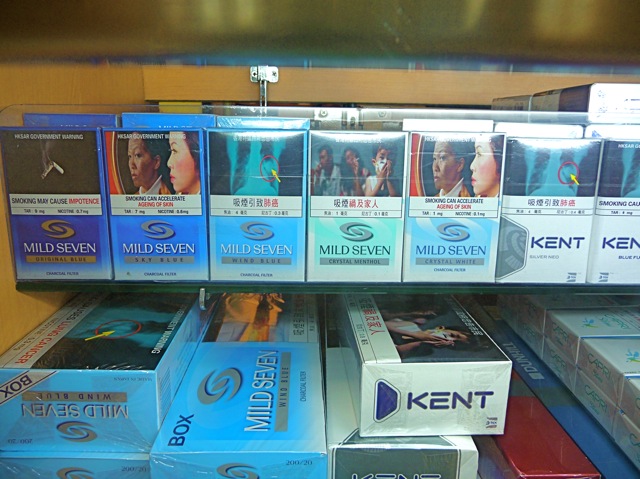
Smoking has been banned in all indoor public places. This box outside one restaurant is full of cigarette butts, discarded by patrons before entering the restaurant.
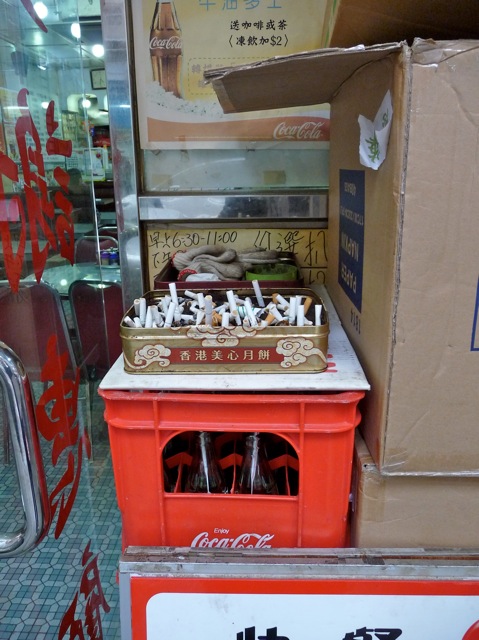
One restaurant is adamant about refusing non-customers from using its toilet. It put up three signs to repeat and repeat its message. But for the payment of HK$10, one would be allowed to use the forbidden toilet.
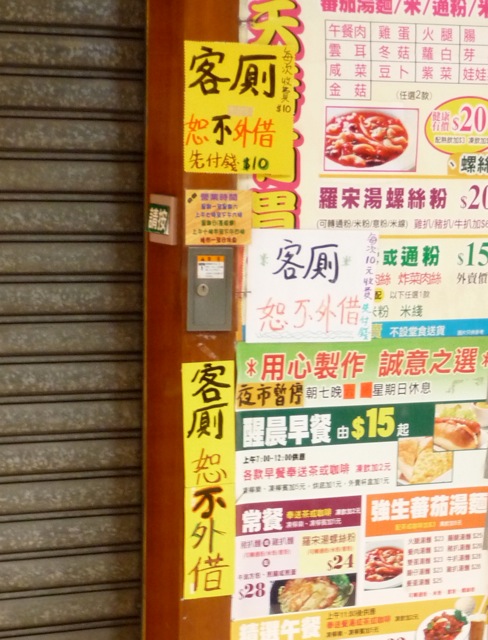
This bar is hiring workers for various positions. One position is for a “boxer”. I guess that’s the bouncer. I wanted to know if they need a referee.
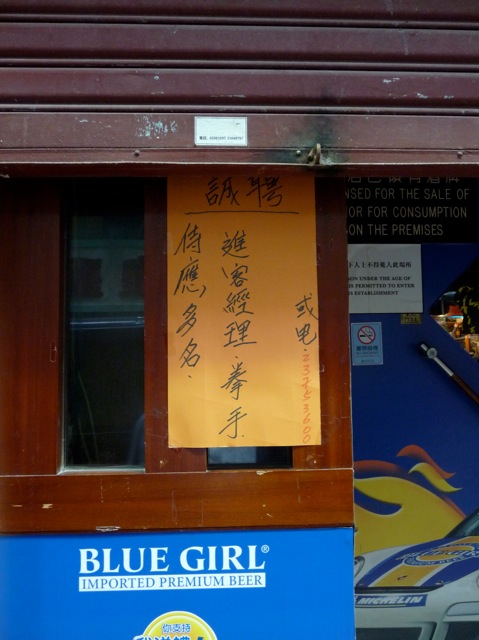
Markets are formed when shops of similar business open in the same area. On this block, 15 money exchange shops post exchange rates and try to compete for business. I wonder how a shop would differentiate itself when it offers the same exchange rate as everybody else.

Hong Kong is single handedly causing the imminent extinction of sharks. Dozens of dried seafood stores congregate on four blocks selling lots of sharks’ fins. As China gets wealthy, the demand for shark fin soup will increase and that may be the final nail on the sharks’ coffin.

Some old houses in Hong Kong should be condemned before they collapse. This old house was propped up with girders in the front, but the storefront shop was still open for business.
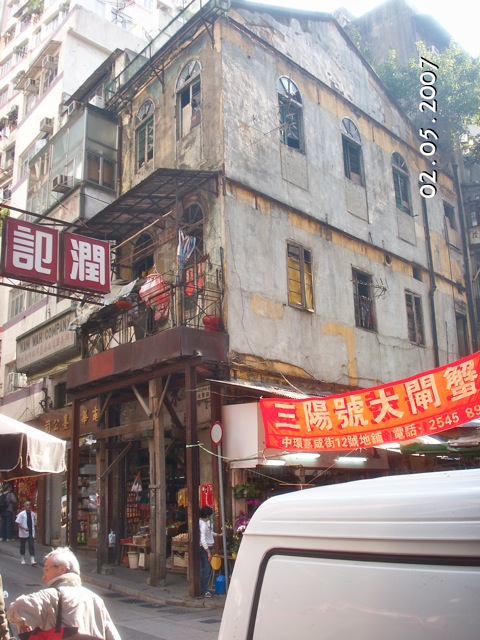
But other old houses are kept in very good condition. This well kept, elegant old house is the pride of a neighborhood.
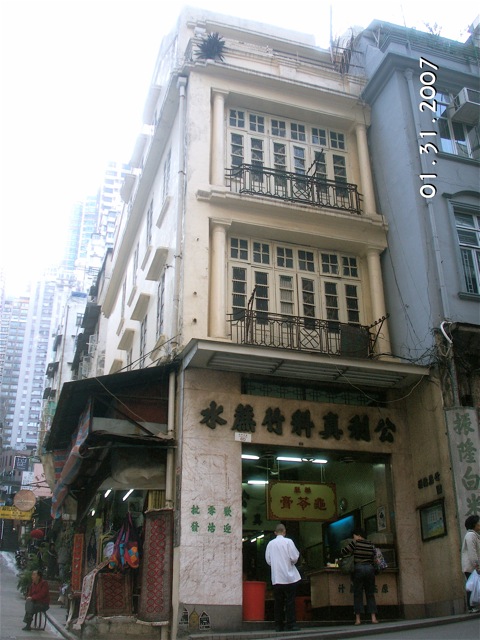
When the government tries to tear down old houses to rebuild a neighborhood, big controversy arises over compensation and over the wisdom of destroying a vibrant neighborhood. Banners protest the relocation of businesses, occupants and the amount of compensation.
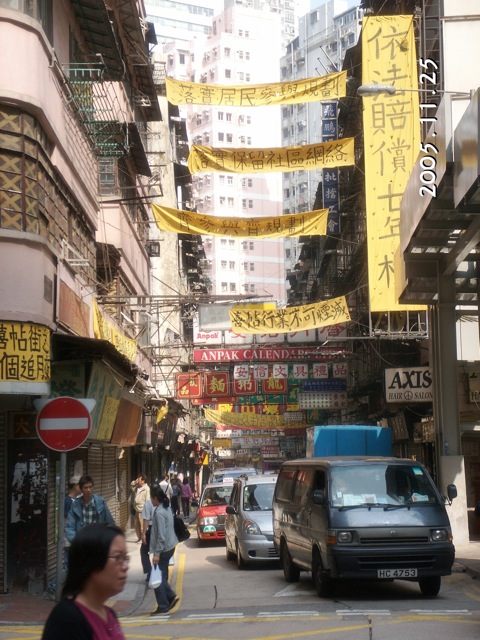
Business can be tough. On one block, seven storefronts in a row are shuttered as businesses failed.

But Hong Kong businessmen are flexible, if not original. One tutoring school names itself after the President of the USA. After-school tutoring to improve test scores is big business in Hong Kong. Some tutors are promoted into stardom like rock stars, and students flock to them like flies.
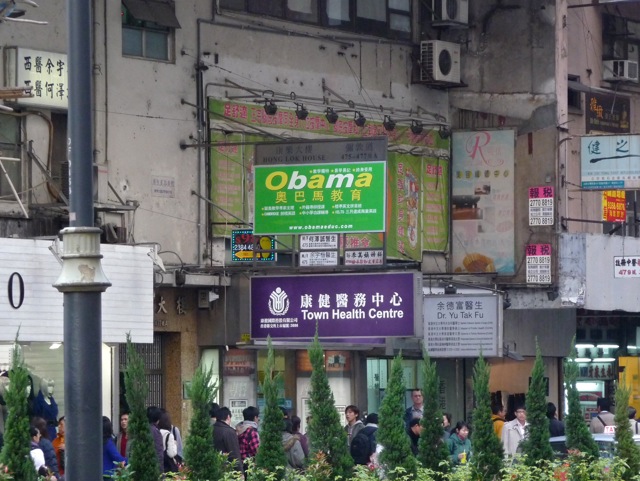
There are about 250,000 foreign domestic maids in Hong Kong. On Sundays, their day off, they congregate in parks and on streets. There are few recreation facilities for them. They entertain themselves by singing, dancing, cutting hair, chatting, and picnicking in all kinds of weather.
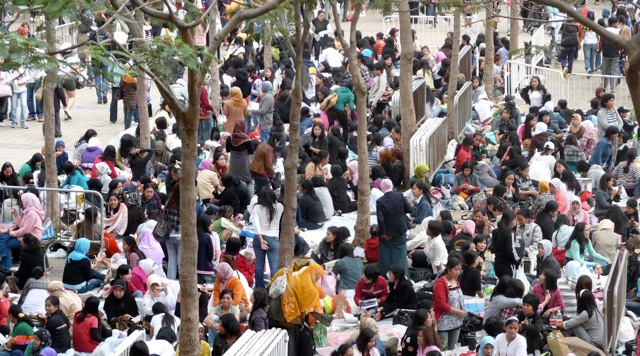
Hong Kong has its share of slums. One area, Kowloon City, was a particularly messy complex. Houses were built among meandering alleys, illicit businesses were conducted, and maintenance was ignored. This was due to a historical curiosity that this area was a Chinese sovereign citadel inside the British colony. Lacking clear jurisdiction, the British government let it fall through the legal cracks.
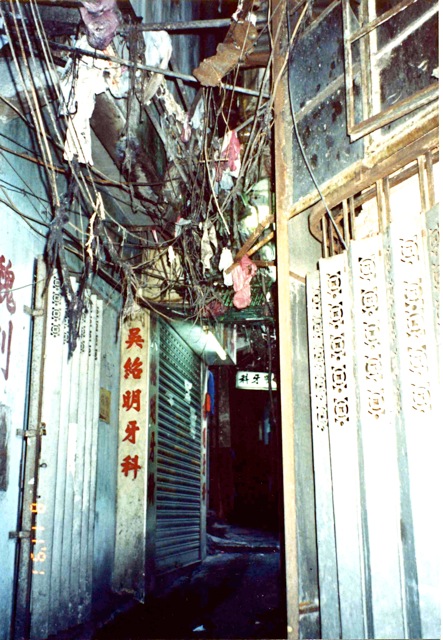
After Kowloon City buildings were finally demolished and cleared, the site was made into a very lush Chinese styled park to commemorate the original Chinese citadel of Kowloon City. The stone plaque over the citadel gate was recovered and is on display in the park.
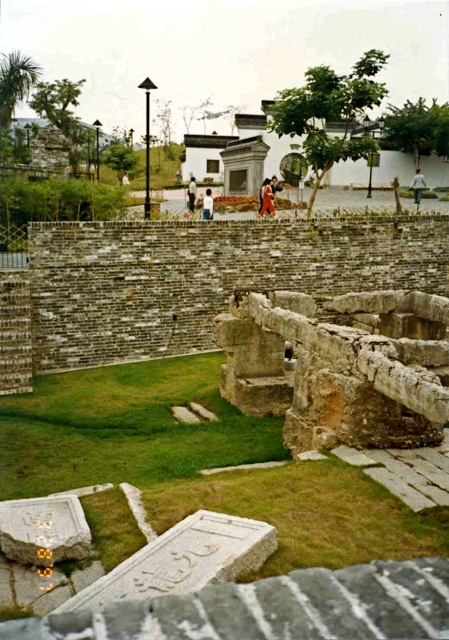
Today, public medical care is practically free. But to see a doctor in a busy neighborhood clinic, people have to reserve a space in a queue early in the morning. Items left against the wall are used as identifications of positions in the queue when the clinic opens.
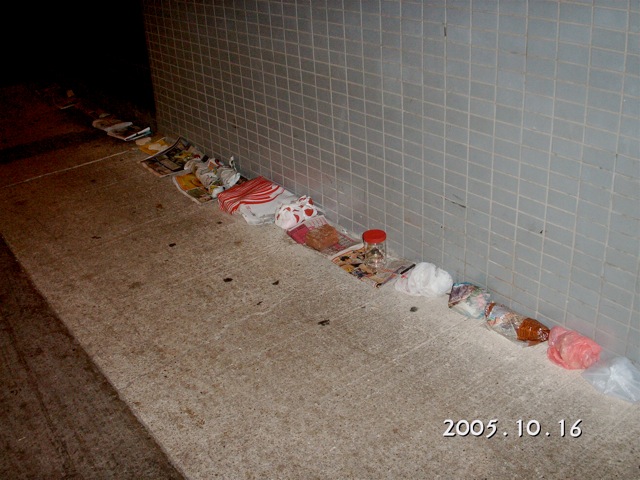
This homeless man makes do with two dogs. True to their nature, the dogs do not seem to mind the living condition and are satisfied just to be with their master. After this picture was taken, the man massaged a dog’s legs and the dog seemed to enjoy the vigorous rub.
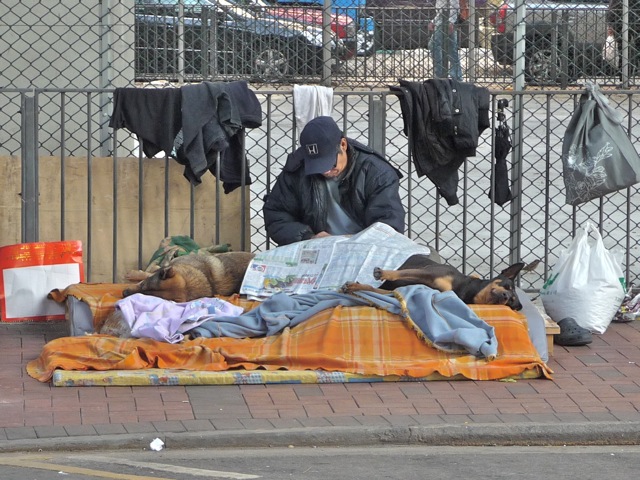
This man cleans public facilities, apparently for very low wages. His intensive attention and pride in his work is an inspiration.
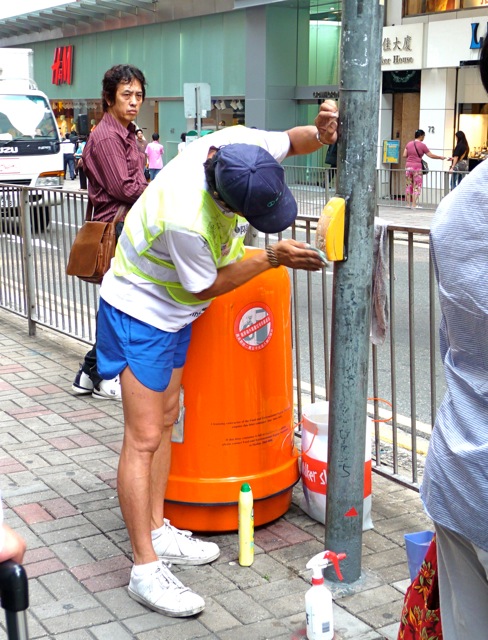
“The emperor of Kowloon” wrote senseless graffiti all over Hong Kong for decades. His death a few years ago is missed as the loss of a Hong Kong icon. He was considered a creative soul by some in the arts community, while others considered him to be just nuts.
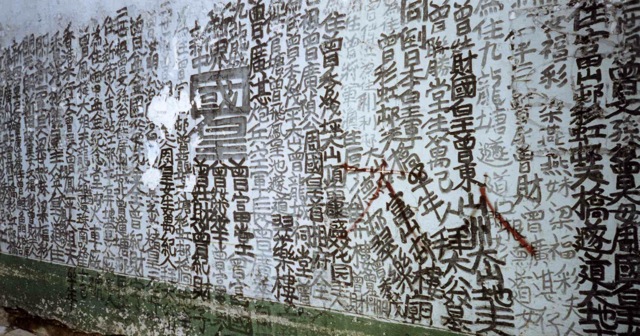
The electric tram has been in use for over a hundred years. Its cars are wooden, open aired, a little uncomfortable, but nostalgic. The new tram does not ring a bell for me. A French company recently bought the tram system, and some Hong Kongers worry this new owner will kill the traditional character of the tram.
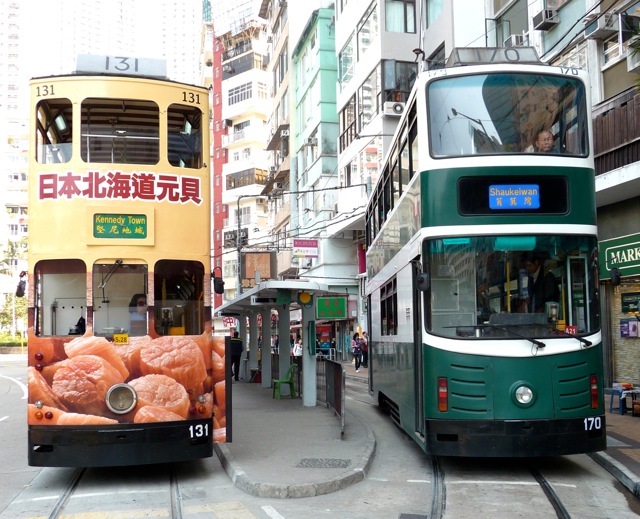
Hong Kong is not plagued by ugly graffiti as many major cities are. I was dismayed when the clean MTR trains were plastered with graffiti as advertisement for McDonald’s. This is one aspect of American culture I hate to see in Hong Kong.
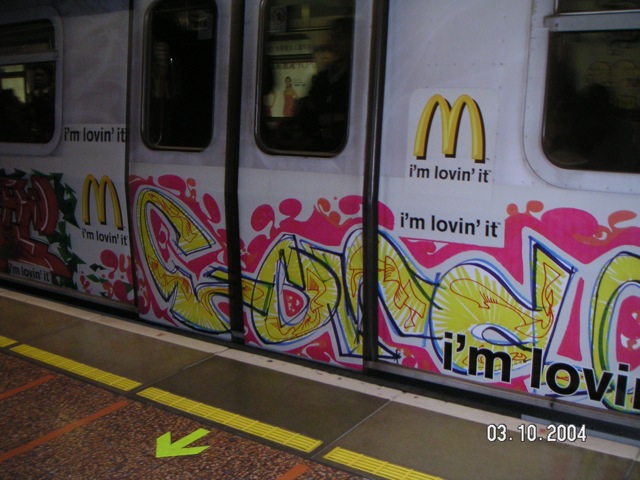
Hong Kong can be serendipitous. I was happily surprised to see a cascading waterfall outside the glass wall of a modern building next to a business district.
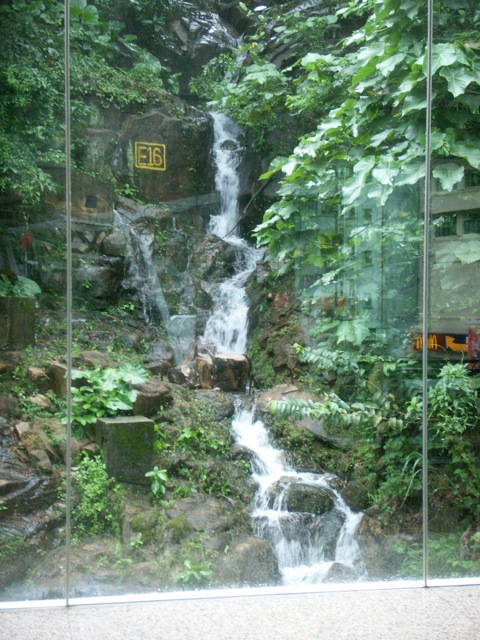
It is estimated that 5,000 kites spend their winter in Hong Kong. In late afternoons, dozens of them can be seen soaring in circles over the dense city.
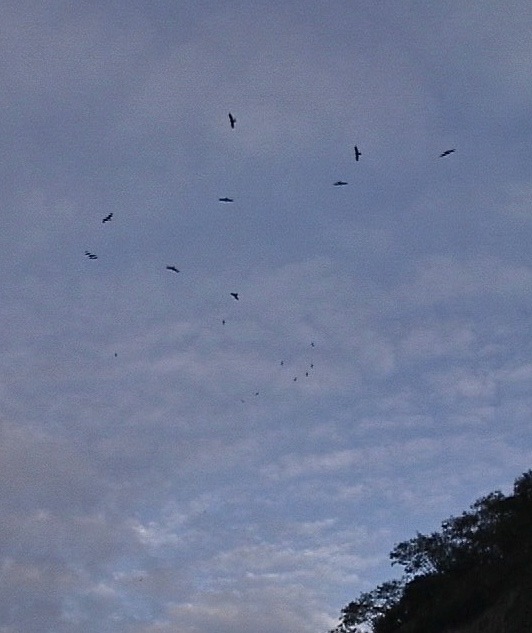
On top of a steep cliff over Hong Kong island, a photographer perched dangerously on a rock outcrop to take pictures.
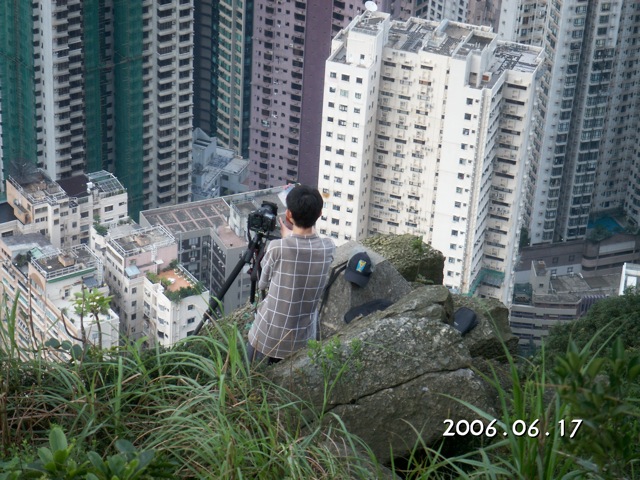
Tall buildings on the waterfront participate in a nightly 15 minutes of laser, fireworks and light display.
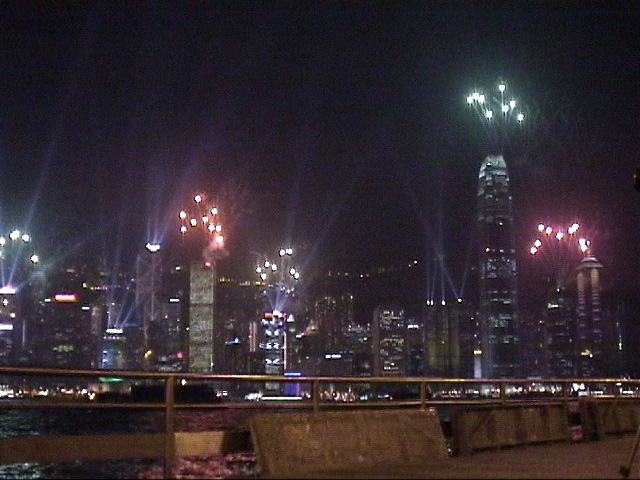
I became addicted to the annual world championship of Rugby 7 games. Seven men play on each side, making the game fast, unpredictable, and exciting. Usually, Fiji and New Zealand are the favorites to win the championship, and fans come from all over the world to watch this game yearly. The antics of spectators in the end zone bleachers create a carnival atmosphere. Sometimes nude streakers would run on the playing field during half-time, chased by the guards and cheered on by the spectators.
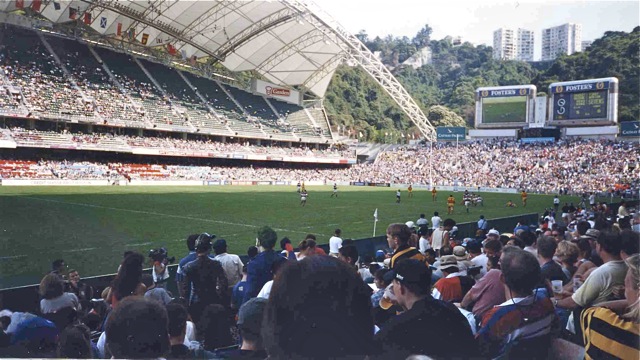
This man was not interested in team sport. He left his belonging on shore and swam in the HK harbor. This was a risky action since raw sewage is poured into the harbor. As a world class city, Hong Kong is very backward in the handling of its waste.
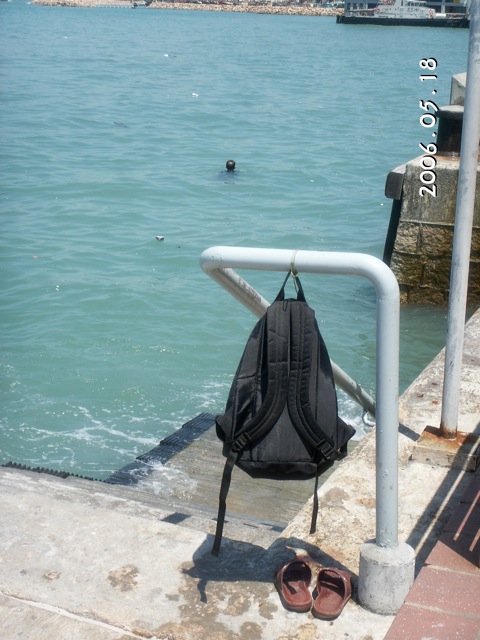
I sat on the stool of a nearly extinct daipaidong eatery, drinking its famous milk tea. This milk tea is a Chinese adaptation of British afternoon tea, but is a much stronger and sweeter tea. Instead of sugar, sweetened condensed milk is used.
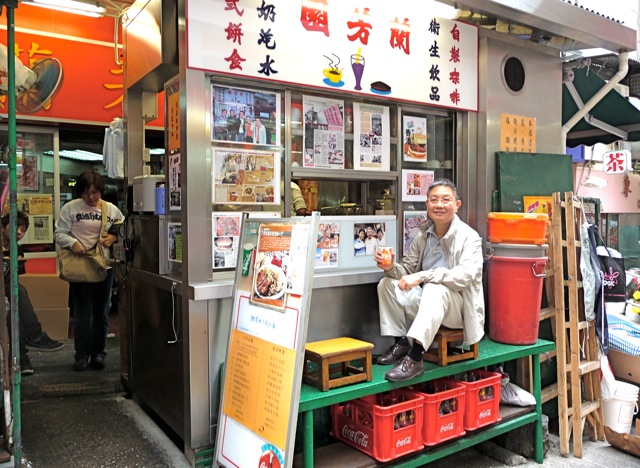
This snake soup shop advertises the king cobras it sold. To the Chinese, more poisonous the snake, greater the medicinal benefits of eating one. These king cobras cost US$1,000 each.
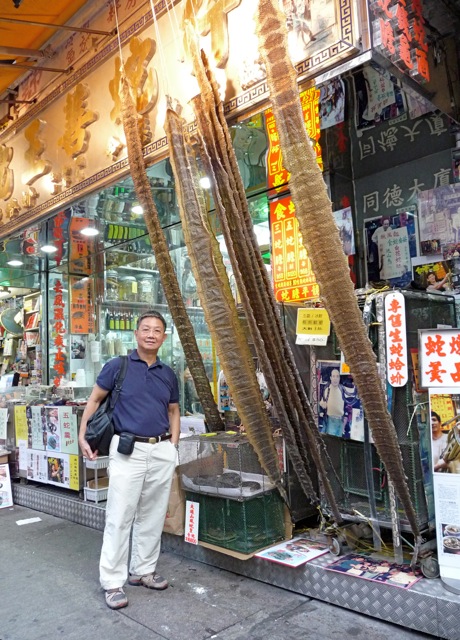
Festive red and gold decorations for the Chinese new year make a joyous scene.
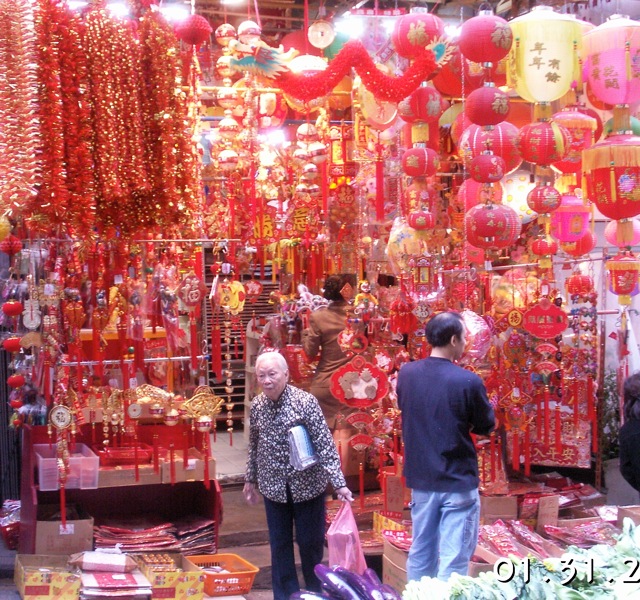
Paper items to be burned as offerings to ancestors. They include dentures, beers, cognacs, dimsums, cigarettes, cokes, radios, sea foods, coffee, camcorder, sushi, roast piglet, and mahjong set. Nothing that is needed for a comfortable afterlife is left out.
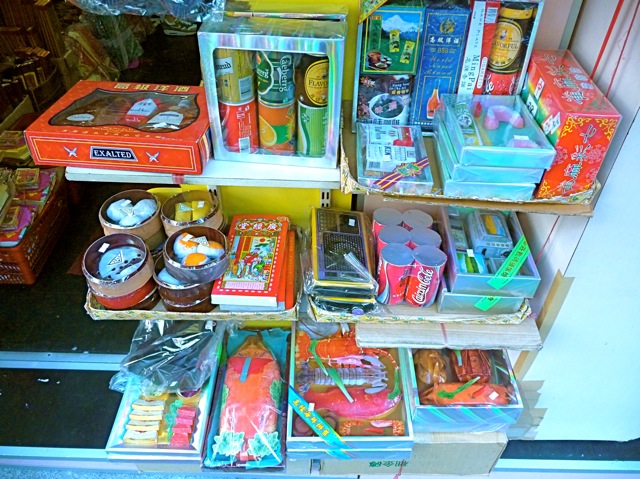
A considerate restaurant owner ducts cool air from inside the store to cool the cashier working outside.
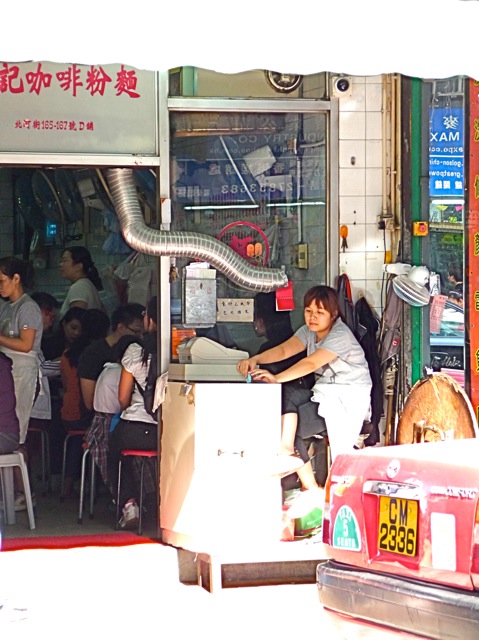
As some Hong Kongers would go to the US to give birth, securing US citizenship for their child, Mainlanders come to Hong Kong to give birth. Once born in Hong Kong, the child would be entitled to all the benefits provided by a generous government. They include inexpensive public housing, very cheap and excellent medical care, and welfare payments. This firm caters to those Mainlanders who wants to give birth in Hong Kong and promises to charge no fees if not successful.
